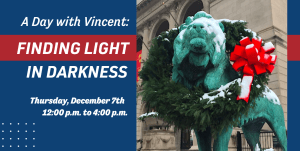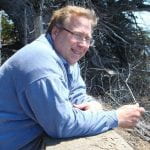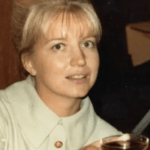
There are times in life when we may struggle to see light in darkness or when we are overcome with doubt. Occasionally, it may seem that the entire world is going in the wrong direction, that hardship is around every corner, or that we may not make it through the present in one piece.
The Christian season of Advent, now upon us, invites us to see with hopeful eyes the presence of grace and the latent potential for goodness waiting to be actualized. Whether in our home lives, in our communities, in our workplace, or in the larger world, each moment offers us this opportunity.
What gets in the way of our realizing it?
I acknowledge many times my underlying feelings get in the way. Maybe I’m sad, irritated, or confused. Or it could be my habitually self-absorbed thought patterns get in the way and prevent me from seeing the opportunities before me.
If I pause to consider it, I know that my feelings at any moment in life are the result of many complex factors that are at once internal and external, objective and subjective, individual and communal, rational and intuitive. Feelings may be caused by what we see, but in every case, they are also likely to color the lens through which we see, and thus accentuate or distort certain aspects of our reality. Likewise, my thought patterns are likely to hold many preconceived expectations and biases that impact what I see as I face new situations and thus how I interpret them.
Thus, I consider the seasons of Advent and Christmas to be an annual gift that invites me into a beneficial communal practice of the Christian community. This annual practice helps to foster the emotional and spiritual readiness necessary to perceive and encounter all that is before us with hopeful expectation. Through story and ritual, this liturgical season reminds us that the present moment is always pregnant with emergent life and goodness.
I share these reflections in this space because they offer lessons for us that are helpful in the workplace, too. What gets in the way of your seeing? Seeing your co-worker with deep respect and care? Seeing past some of the prejudicial biases or defensive personal habits you have developed over time? Seeing with hope? Seeing the opportunity to accentuate or contribute to the goodness of our university community during your day? And what might help to restore you to seeing more clearly?
As we approach a time that may allow a bit more space for rest and rejuvenation from our regular work and life patterns, how might you ready or restore yourself to be able to see the new life that is emerging for you, within you, and around you? In your work situation, in your home life, or in your community, how might there be latent potential for goodness and new life?
Your answer to these questions may be exactly one of the gifts you are meant to receive this holiday season. May you recognize it, receive it, and give thanks for the way it calls you forward to new life and hope in the year ahead!
Reflection by: Mark Laboe, Associate VP, Mission and Ministry



 Winter Clothing and Blanket Drive
Winter Clothing and Blanket Drive
 Eric Hoerdemann, the brother of Carolyn Hoerdemann, faculty member of the Theatre School, passed away on November 21, 2023 at the age of 60. Eric enjoyed spending time with his family, traveling, and sports. He is survived by his wife, three children, four siblings, and extended family and friends. He will be greatly missed.
Eric Hoerdemann, the brother of Carolyn Hoerdemann, faculty member of the Theatre School, passed away on November 21, 2023 at the age of 60. Eric enjoyed spending time with his family, traveling, and sports. He is survived by his wife, three children, four siblings, and extended family and friends. He will be greatly missed.


 Patricia Corinne McMahon, the mother-in-law of Susan McMahon of the Psychology Department, passed away on November 6, 2023 at the age of 89.
Patricia Corinne McMahon, the mother-in-law of Susan McMahon of the Psychology Department, passed away on November 6, 2023 at the age of 89. David Frank Dvorak, the brother of Susan McMahon of the Psychology Department, passed away on October 19. 2023 at the age of 62, after a brief illness.
David Frank Dvorak, the brother of Susan McMahon of the Psychology Department, passed away on October 19. 2023 at the age of 62, after a brief illness.